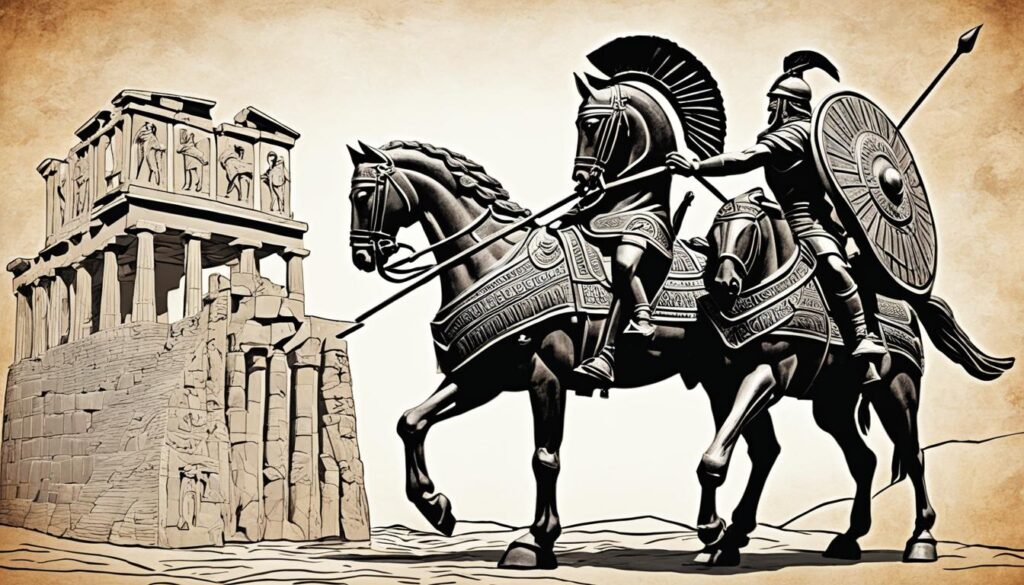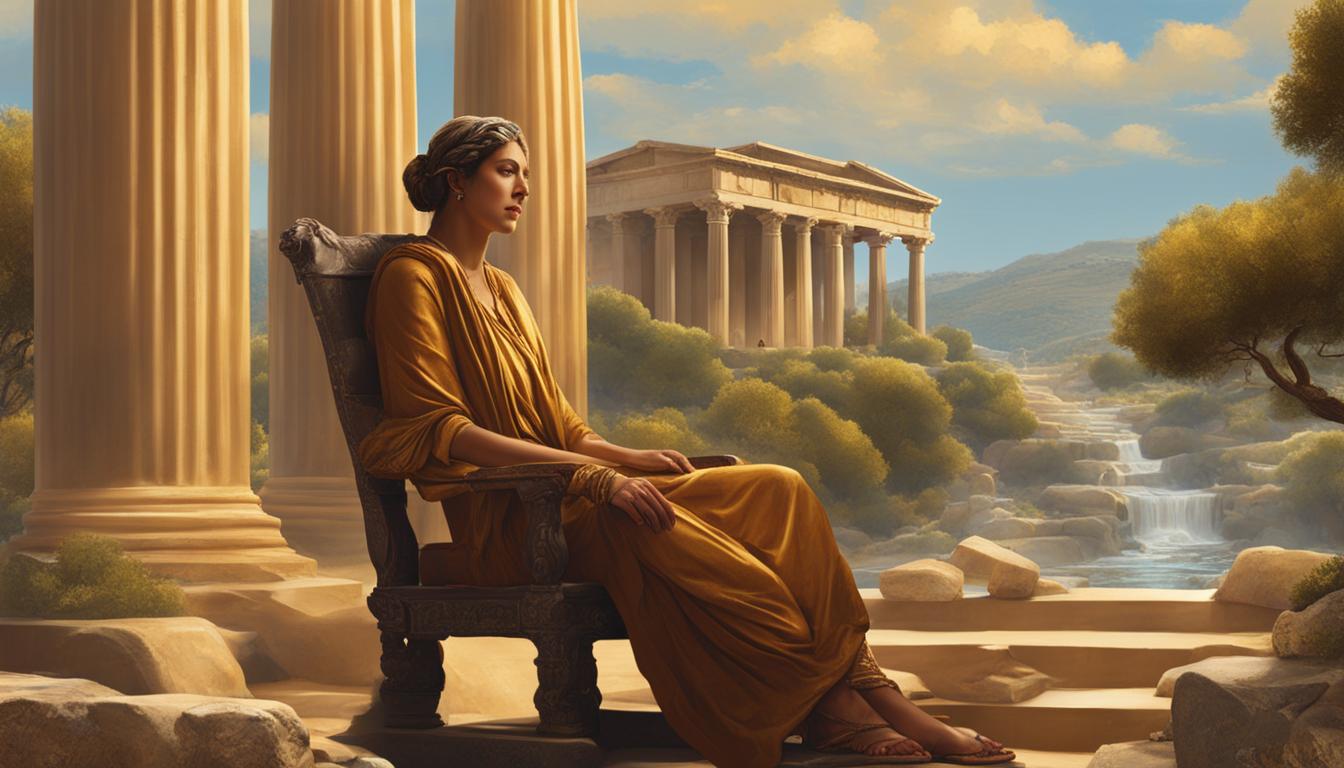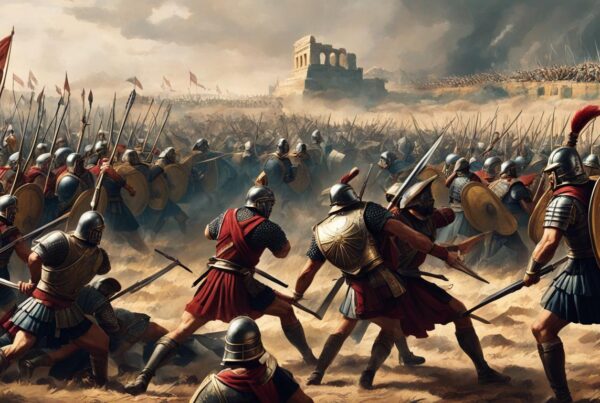In this audiobook review, we take a comprehensive look at Homer’s epic poem, The Odyssey. As one of the most influential works of ancient Greek literature, it continues to captivate and inspire readers today. Our review explores the audiobook version of this epic tale, delving into the nuances of its narration and performance.
Join us as we journey through the mythical landscape of ancient Greece, following the adventures of the cunning hero Odysseus as he attempts to return home after the Trojan War. Through our analysis, we highlight the enduring themes and symbolism that make The Odyssey a literary masterpiece, and provide recommendations for the best editions and translations available.
If you’re a lover of literature, history, or epic tales of adventure, this audiobook review of The Odyssey is not to be missed.
Overview of “The Odyssey”
Believed to have been composed by the Greek poet Homer in the 8th century BCE, “The Odyssey” is one of the most celebrated and enduring works of ancient Greek literature. A sequel to Homer’s epic poem “The Iliad,” “The Odyssey” tells the story of Odysseus, a hero of the Trojan War, and his adventurous journey home to Ithaca.
“The Odyssey” is widely regarded as a cornerstone of Western literature, with its themes of courage, loyalty, and perseverance resonating across many generations and cultures. Its influence is evident in everything from contemporary literature and film to popular culture and advertising.
| Author | Historical Context | Significance |
|---|---|---|
| Homer | Composed in the 8th century BCE, during the Archaic period of ancient Greece. | “The Odyssey” is considered one of the greatest works of ancient Greek literature, with its themes and characters inspiring countless works of literature and art. |
While the authorship of “The Odyssey” remains a topic of debate, it is generally attributed to Homer, a blind bard from the Greek island of Chios. The epic poem is believed to have been composed during the Archaic period of ancient Greece, a time of great artistic and cultural flourishing.
“The Odyssey” reflects the values and beliefs of ancient Greek society, placing emphasis on bravery, cunning, and hospitality. The story features many iconic characters, including the cunning Odysseus, the loyal Penelope, and the fearsome Cyclops Polyphemus.
“Sing in me, Muse, and through me tell the story
Of that man skilled in all ways of contending,
The wanderer, harried for years on end,
After he plundered the stronghold
On the proud height of Troy.”
Homer: The Blind Poet of Chios
Homer is believed to have been born in the 8th century BCE, during the Archaic period of ancient Greece. Very little is known about his life, and some scholars even question whether he was a real person or a collective identity for a group of poets. However, it is widely accepted that Homer was a blind bard from the Greek island of Chios who composed two of the most significant works of ancient Greek literature: “The Iliad” and “The Odyssey.”
Ancient Greek Epic Poetry
“The Odyssey” is part of a long tradition of epic poetry in ancient Greece. An epic is a long narrative poem that tells the story of heroes and gods, often featuring themes of war, love, and adventure. Epics were typically recited orally and associated with the religious and social events of ancient Greek civilization.
- “The Odyssey” is one of two major ancient Greek epic poems attributed to Homer, the other being “The Iliad.”
- Epic poetry was an important part of ancient Greek culture and played a significant role in shaping its values and beliefs.
Plot Summary
“The Odyssey” tells the story of the Greek hero Odysseus and his ten-year struggle to return home after fighting in the Trojan War. As the epic poem opens, Odysseus has been stranded on the island of Ogygia for seven years, held captive by the goddess Calypso. With the help of the goddess Athena, who favors Odysseus, he is finally able to leave Ogygia and begin his journey back to Ithaca, his homeland.
However, Odysseus faces numerous obstacles, including storms, sea monsters, and the wrath of the god Poseidon, who is angry at him for blinding his son, Polyphemus. Along the way, he encounters various allies, such as the nymph Calypso, the witch Circe, and the Phaeacians, who eventually help him return safely to Ithaca.
Meanwhile, back in Ithaca, Odysseus’ wife, Penelope, is being courted by several suitors who are trying to take advantage of Odysseus’ absence. With the help of his son, Telemachus, Odysseus is able to defeat the suitors and reclaim his throne. The epic ends with Odysseus reunited with Penelope and restored as the rightful ruler of Ithaca.
Characters in “The Odyssey”
In Homer’s epic poem “The Odyssey,” readers are introduced to a cast of colorful characters, each with their own unique story and significance to the narrative. The hero of the story is the cunning and resourceful Odysseus, who faces numerous challenges and battles on his journey home from the Trojan War. Along the way, he encounters a host of mythical creatures and characters, including the seductive sorceress Circe and the terrifying Cyclops Polyphemus.
One of the most significant characters in “The Odyssey” is Odysseus’s wife, Penelope. Her faithfulness and loyalty to her absent husband are a powerful symbol of enduring love and devotion. She fends off numerous suitors vying for her hand, using her cunning wit and intellect to outsmart them at every turn.
The gods also play a crucial role in the narrative, with Athena serving as Odysseus’s wise and protective guide, while Poseidon seeks revenge against the hero for blinding his son, the Cyclops. Other notable characters include the bard Phemius, who entertains the suitors with his music, and the loyal swineherd Eumaeus, who helps Odysseus reclaim his throne upon his return to Ithaca.
Characters in “The Odyssey”
| Character Name | Description and Significance |
|---|---|
| Odysseus | The protagonist and hero of the story. Known for his cunning, bravery, and resourcefulness. |
| Penelope | Odysseus’s loyal wife, who fends off numerous suitors vying for her hand. |
| Athena | The goddess of wisdom and Odysseus’s guide and protector throughout his journey home. |
| Poseidon | The god of the sea and Odysseus’s enemy, seeking revenge for the blinding of his son, Polyphemus. |
| Circe | A sorceress who transforms Odysseus’s crew into pigs and becomes his lover. |
| Polyphemus | A one-eyed Cyclops who captures Odysseus and his crew and is blinded by the hero. |
| Telemachus | Odysseus’s son, who embarks on a journey to find his missing father and becomes a warrior in his own right. |
| Eumaeus | A loyal swineherd who helps Odysseus reclaim his throne upon his return to Ithaca. |
These characters and many others contribute to the rich tapestry of “The Odyssey,” making it one of the most enduring and beloved works of literature in history.
Themes and Symbolism
In “The Odyssey,” Homer masterfully weaves together various themes and symbols to create a rich tapestry of storytelling.
The power of storytelling
One of the most significant themes in “The Odyssey” is the power of storytelling. Odysseus often relies on his ability to weave tales to outwit his opponents, and even the epic itself is a testament to the lasting impact of storytelling on human culture.
“Sing in me, Muse, and through me tell the story
Of that man skilled in all ways of contending,
The wanderer, harried for years on end,
…
Homer’s invocation of the Muse is a nod to the oral tradition of ancient Greek poetry, where poets would often summon a divine entity to inspire their storytelling.
Heroism
The concept of heroism is another vital theme in “The Odyssey.” Odysseus, the hero of the story, embodies many of the traits associated with classical heroism, such as courage, strength, and cunning. His journey is one of perseverance and self-discovery, demonstrating the transformative power of heroism.
Divine intervention
The gods play a significant role in “The Odyssey,” with many of the characters relying on divine intervention to navigate their journeys. This theme underscores the belief in ancient Greece that human lives were intertwined with the gods and that individuals often needed their assistance to overcome life’s challenges.
The human condition
Perhaps the most profound theme in “The Odyssey” is its exploration of the human condition. The various characters in the epic face a myriad of challenges and obstacles, highlighting the struggles faced by all human beings as they navigate their lives.
Symbolism also plays a significant role in “The Odyssey.” For example, the epic’s portrayal of the cyclops Polyphemus can be interpreted as a metaphor for the dangers of unrestrained power and hubris. Likewise, the act of weaving is a potent symbol throughout the epic, representing both the power of stories to shape the world and the complex nature of human experience.
Writing Style and Language
“The Odyssey” is renowned for its intricate poetic language and unique writing style, which reflect the influence of Ancient Greek oral tradition. Homer’s use of epithets, repeated phrases that describe a character or object, serves as a mnemonic device for the audience. They also create a sense of rhythm and flow, making the epic easier to remember and recite.
Another distinctive aspect of “The Odyssey” is its use of similes and metaphors to convey complex emotions and ideas through vivid imagery. For instance, when Odysseus reunites with his son Telemachus, Homer writes: “The tears streamed from him and he wept aloud, crying out that they had broken his heart, mother and son together, heartless creatures.” This powerful metaphor conveys the depth of Odysseus’s sadness and betrayal in a visceral way.
Homer’s writing style and language have influenced literary traditions for centuries to come. His epic has been translated into numerous languages and adapted into various forms, from plays to films. The timeless appeal of “The Odyssey” lies in the intricate weaving of the narrative, language, and themes into an unforgettable experience for the reader.

Narration and Audiobook Performance
The narration of an audiobook can make or break the listener’s experience, and when it comes to “The Odyssey,” a skilled narrator is essential in bringing the epic to life. Many audiobooks of “The Odyssey” are available in the market, and choosing the right one can be daunting.
Our top recommendation is the audiobook version read by Ian McKellen, the acclaimed British actor famous for his portrayal of Gandalf in “The Lord of the Rings” movie trilogy. In this narration, McKellen’s rich and emotive voice captures the essence of Homer’s epic, making it a delight to listen to from start to finish.
“Ian McKellen’s rich and emotive voice captures the essence of Homer’s epic, making it a delight to listen to from start to finish.”
In addition to McKellen’s version, other notable narrations of “The Odyssey” include those by Dan Stevens, George Guidall, and Claire Danes. Each offers a unique interpretation of the epic, so it’s worth exploring to find the one that resonates with you.
Historical and Literary Significance
Homer’s epic poem “The Odyssey” is considered one of the most influential works of classical literature. The poem not only reflects the culture and values of ancient Greece, but it also laid the foundation for Western literature’s literary tradition. Its literary significance lies in its masterful storytelling, character development, and use of cultural and mythological symbolism.
The Odyssey has been a subject of interest and discussion among scholars and literary enthusiasts for centuries. Its influence on subsequent works of literature is undeniable, with numerous literary works, from Dante’s “Divine Comedy” to James Joyce’s “Ulysses,” taking inspiration from its themes and narrative structure.
The poem also carries significant historical value, as it provides a peek into the culture, beliefs, and practices of ancient Greece. The customs, rituals, and social structures depicted in the poem are informative for historians and anthropologists studying the era.
The Odyssey not only captured the imagination of the ancient Greek audience, but it continues to fascinate readers worldwide to this day. Its universal themes of adventure, love, and perseverance transcend time and culture, leaving an indelible mark on the literary world.
Cultural Impact and Adaptations
The influence of “The Odyssey” can be seen in numerous adaptations across various mediums. From stage productions to films, the epic has captured the imagination of audiences around the world.
One of the earliest known adaptations of “The Odyssey” is the play “Odysseus” by Greek playwrights Aeschylus, Sophocles, and Euripides. The play was performed in Athens during the fifth century BCE and is considered one of the greatest tragedies in ancient Greek literature.
In contemporary times, “The Odyssey” continues to inspire adaptations that explore its themes and characters in new and exciting ways. One notable example is James Joyce’s novel “Ulysses,” which follows the parallel journeys of its main character, Leopold Bloom, and those of Odysseus.
Another noteworthy adaptation is the Coen Brothers’ film “O Brother, Where Art Thou?” The movie, loosely based on “The Odyssey,” follows three convicts as they journey home during the Great Depression while encountering characters and events similar to those in the epic.
Other notable adaptations include Derek Walcott’s play “The Odyssey: A Stage Version,” Margaret Atwood’s “The Penelopiad,” and even a Japanese anime series called “Ulysses 31.”
The Odyssey’s Legacy
The lasting cultural impact of “The Odyssey” can be seen in its continued relevance in contemporary literature, film, and popular culture. Its influence on storytelling has been profound, inspiring countless works that explore its themes of heroism, homecoming, and the power of the human spirit to overcome obstacles.
The epic also continues to be studied and admired for its sophisticated use of language, poetic techniques, and exploration of profound universal themes.
Critical Reception and Legacy
“The Odyssey” has been widely regarded as a masterpiece of ancient Greek literature, and its critical reception has been overwhelmingly positive over the centuries. In ancient Greece, the epic poem had a significant cultural impact, inspiring other writers and artists to explore similar themes and characters in their works. Renaissance scholars rediscovered “The Odyssey” in the fourteenth and fifteenth centuries, sparking a renewed interest in ancient Greek literature and culture.
Today, “The Odyssey” continues to captivate readers of all ages and backgrounds with its timeless portrayal of heroism, adventure, and perseverance. The epic’s legacy in contemporary literature is evident in the many adaptations, retellings, and references found in modern works of fiction and nonfiction. From James Joyce’s Ulysses to Margaret Atwood’s The Penelopiad, “The Odyssey” has left an indelible mark on the literary world and beyond.
Table of Critical Reception of “The Odyssey”
| Time Period | Critical Reception |
|---|---|
| Ancient Greece (8th century BCE) | The epic poem was highly regarded by the ancient Greeks and was often recited at festivals and public events. |
| Renaissance (14th-16th centuries) | Scholars rediscovered “The Odyssey” and placed it alongside “The Iliad” as one of the greatest works of Western literature. |
| 20th century | “The Odyssey” continued to receive critical acclaim and inspired numerous adaptations and reimaginings, including films, television shows, and novels. |
“The Odyssey” stands as one of the greatest achievements of Western literature, a timeless epic that continues to inspire and captivate readers of all ages and backgrounds.” – Robert Fagles, translator of “The Odyssey”
Comparison with “The Iliad”
Homer’s “The Odyssey” and “The Iliad” are two of the most famous pieces of ancient Greek literature. Both epics are attributed to Homer and have had a significant impact on Western culture. While both epics share some similarities, they are also quite different in many ways.
Themes
One of the most apparent differences between “The Odyssey” and “The Iliad” is their thematic focus. “The Iliad” primarily deals with the Trojan War and the battle between the Greeks and Trojans, whereas “The Odyssey” follows the hero Odysseus in his quest to return home. While both epics explore themes of heroism, the nature of the divine, and the human condition, “The Odyssey” places a greater emphasis on the concept of homecoming and the importance of family.
Characters
Another significant difference between the two epics is the characterization of their respective heroes. In “The Iliad,” Achilles is portrayed as a powerful warrior whose pride defines him. Conversely, Odysseus in “The Odyssey” is presented as a cunning and resourceful hero whose wit and intelligence prove more critical than mere physical strength. Additionally, “The Odyssey” features several prominent female characters, such as the wise goddess Athena and Penelope, Odysseus’ loyal wife.
Storytelling Techniques
Despite their differences, both epics share Homer’s storytelling techniques, such as the use of epic similes and epithets. However, “The Odyssey” also employs framing devices such as the use of flashbacks and prolepsis (when a narrative reveals something that will occur in the future) which “The Iliad” does not utilize to the same extent.
The Ultimate Comparison
| The Odyssey | The Iliad | |
|---|---|---|
| Themes | Homecoming, family, heroism, divine intervention, the power of storytelling, the exploration of the human condition | War, heroism, the nature of the divine, the human condition |
| Characters | Odysseus, Penelope, Athena | Achilles, Hector, Agamemnon |
| Storytelling Techniques | Use of flashbacks and prolepsis, epic similes, epithets | Epic similes, epithets |

Recommended Editions and Translations
For readers interested in exploring Homer’s “The Odyssey” in its original form, reputable translations include Robert Fagles’ version (Viking Press, 1996), which offers a poetic and accessible rendition of the epic. Other popular editions include the translation by Emily Wilson (W.W. Norton & Company, 2017), which highlights the voices of women and slaves in the narrative, and the classic translation by Samuel Butler (Digireads.com Publishing, 2005).
For audiobook enthusiasts, we recommend the performance by Ian McKellen (Penguin Random House Audio, 1997), whose rich and expressive voice captures the drama and beauty of the epic. Other quality audiobook editions include the performances by Dan Stevens (Audible Studios, 2014) and Simon Callow (Naxos Audiobooks, 2003).
“Whichever edition or translation you choose, make sure to savor the timeless magic of Homer’s epic, which continues to resonate with readers and listeners today.”
Analysis of Selected Passages
Amidst this epic tale of adventure and heroism, Homer introduces several passages that provide a deeper understanding of the characters and themes in “The Odyssey.” One such passage is found in Book 9, where Odysseus recounts his encounter with the cyclops Polyphemus. The passage showcases Odysseus’ cunning strategies, and how he outwits the formidable monster to escape with his men.
Another notable passage is in Book 12, where Odysseus confronts the treacherous Sirens, whose alluring voices have lured many sailors to their doom. In this passage, we see the power of temptation and the strength required to resist it.
Throughout the narrative, Homer employs vivid imagery and metaphors that further enrich the themes and symbols in “The Odyssey.” For instance, the image of the lotus flower, which causes some of Odysseus’ men to forget their homes, illustrates the danger of succumbing to instant gratification and losing sight of one’s goals.
Symbols and Themes in Selected Passages
These selected passages offer deeper insights into the themes and symbols woven into “The Odyssey.” The cyclops encounter highlights Odysseus’ resourcefulness and quick thinking, while the Siren episode illustrates the allure of temptation and the consequences of giving in to it. The image of the lotus flower represents the danger of indulgence and losing sight of one’s purpose in life.
| Selected Passage | Themes | Symbols |
|---|---|---|
| Odysseus and Polyphemus encounter in Book 9 | Cunning, resourcefulness, courage | Cyclops, blindness, trickery |
| Odysseus and the Sirens in Book 12 | Temptation, resistance, perseverance | Sirens, alluring voices, danger |
| The lotus flower image | Instant gratification, loss of purpose | Lotus flower, addiction, forgetfulness |
“The Odyssey” showcases the timeless themes and symbols that have captivated readers for centuries. These selected passages offer a glimpse of the richness and depth of Homer’s epic narrative, and how they convey the complexity of the human condition.
Reception Among Different Audiences
Over the centuries, “The Odyssey” has been widely read and celebrated by audiences of all backgrounds and ages. The epic poem’s timeless themes of adventure, heroism, and perseverance have resonated with readers across the globe, making it one of the most enduring works of literature in history.
Despite its ancient origins, “The Odyssey” remains relevant today, captivating modern audiences with its vivid characters, thrilling plot, and thought-provoking symbolism. Scholars continue to study the poem in universities and academic institutions, drawing insights from its unique cultural and historical context.
Casual readers, on the other hand, have found entertainment and inspiration in the epic’s dramatic storytelling and relatable characters. Younger readers have also discovered the world of “The Odyssey” through adaptations, from illustrated children’s books to animated films and video games.
Audience Reception of “The Odyssey”
| Group | Reception |
|---|---|
| Scholars and Academics | Highly regarded for its cultural and literary significance; subject of extensive research and analysis |
| General Readers | Well-loved for its riveting storytelling, compelling characters, and enduring themes; widely read and accessible to diverse audiences |
| Young Readers | Discovered through adaptations in various formats, including illustrated books, animated films, and video games; inspires a love of learning and imagination |
From scholars to casual readers to young audiences, “The Odyssey” continues to captivate and inspire generations of readers worldwide.
Contemporary Relevance of “The Odyssey”
Homer’s “The Odyssey” is an ancient Greek epic poem that continues to resonate with modern readers and address universal human experiences. The themes and lessons portrayed in the epic are still relevant today and can be seen in various aspects of contemporary culture, including literature, film, television, and more.
The story of Odysseus’ journey home after the Trojan War highlights the importance of perseverance, determination, and bravery in the face of adversity. These traits are still highly valued in society today. The epic also explores the concepts of heroism, storytelling, and the human condition, which continue to be analyzed and discussed in academic and cultural circles.
More than merely a literary work, “The Odyssey” provides insight into ancient Greek culture and mythology, making it valuable for historians and anthropologists seeking to understand the roots of Western civilization. Furthermore, the epic’s exploration of the relationship between mortals and the gods is still relevant in contemporary discussions of faith and spirituality.
Overall, “The Odyssey” remains a significant and influential work of literature, speaking to readers across generations and cultures. Its timeless themes and captivating storytelling ensure that it will continue to be studied and appreciated for many years to come.
Conclusion
In conclusion, Homer’s “The Odyssey” continues to be one of the most beloved and influential works in literature. Its timeless themes of adventure, perseverance, and the human condition have captivated audiences for centuries, and its impact can be seen across various art forms and media. From the significance of its historical and cultural context to its poetic language and storytelling techniques, “The Odyssey” offers a journey through ancient Greece that is not to be missed.
Whether you’re a scholar or a casual reader, there’s something to be gained from experiencing this epic poem. Its exploration of heroism, divine intervention, and the power of storytelling is as relevant today as it was thousands of years ago. So, if you’re looking for a thrilling adventure that will leave you with a deeper understanding of the human experience, pick up a copy of “The Odyssey” and prepare to embark on a journey that will stay with you for a lifetime.



